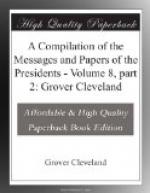If no other proof existed of a predetermination of the British Government against a repeal of its orders, it might be found in the correspondence of the minister plenipotentiary of the United States at London and the British secretary for foreign affairs in 1810, on the question whether the blockade of May, 1806, was considered as in force or as not in force. It had been ascertained that the French Government, which urged this blockade as the ground of its Berlin decree, was willing in the event of its removal to repeal that decree, which, being followed by alternate repeals of the other offensive edicts, might abolish the whole system on both sides. This inviting opportunity for accomplishing an object so important to the United States, and professed so often to be the desire of both the belligerents, was made known to the British Government. As that Government admits that an actual application of an adequate force is necessary to the existence of a legal blockade, and it was notorious that if such a force had ever been applied its long discontinuance had annulled the blockade in question, there could be no sufficient objection on the part of Great Britain to a formal revocation of it, and no imaginable objection to a declaration of the fact that the blockade did not exist. The declaration would have been consistent with her avowed principles of blockade, and would have enabled the United States to demand from France the pledged repeal of her decrees, either with success, in which case the way would have been opened for a general repeal of the belligerent edicts, or without success, in which case the United States would have been justified in turning their measures exclusively against France. The British Government would, however, neither rescind the blockade nor declare its nonexistence, nor permit its nonexistence to be inferred and affirmed by the American plenipotentiary. On the contrary, by representing the blockade to be comprehended in the orders in council, the United States were compelled so to regard it in their subsequent proceedings.
There was a period when a favorable change in the policy of the British cabinet was justly considered as established. The minister plenipotentiary of His Britannic Majesty here proposed an adjustment of the differences more immediately endangering the harmony of the two countries. The proposition was accepted with the promptitude and cordiality corresponding with the invariable professions of this Government. A foundation appeared to be laid for a sincere and lasting reconciliation. The prospect, however, quickly vanished. The whole proceeding was disavowed by the British Government without any explanations which could at that time repress the belief that the disavowal proceeded from a spirit of hostility to the commercial rights and prosperity of the United States; and it has since come into proof that at the very moment when the public minister was holding the language of friendship and inspiring confidence in the sincerity of the negotiation with which he was charged a secret agent of his Government was employed in intrigues having for their object a subversion of our Government and a dismemberment of our happy union.




